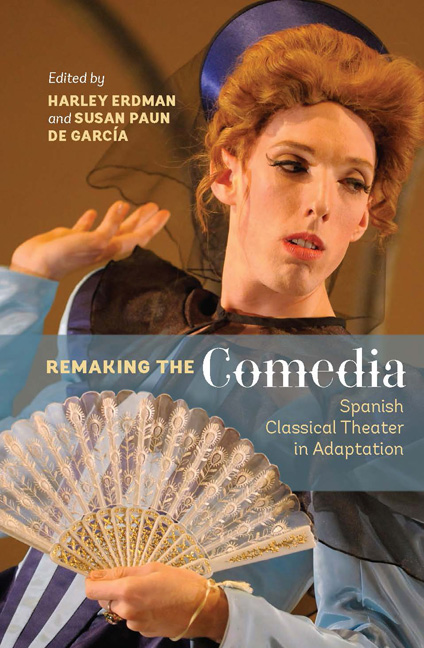Book contents
- Frontmatter
- Contents
- Illustrations
- Contributors
- Preface
- Note to the Reader
- Acknowledgements
- PART I THEORIZING
- PART II SURVEYING
- 5 Refundición Redux: Revisiting the Rewritten Comedia
- 6 Pepe Estruch and the Performance of Golden Age Drama: International Relationships under Franco and Democratic Theatrical Cultures
- 7 Thinking Globally, Acting Locally, and Performing Nationalism: Local, National, and Global Remakes of the Comedia
- 8 Four Decades of the Chamizal Siglo de Oro Drama Festival and the Evolution of Comedia Performance
- 9 Early Modern Dramaturgas: A Contemporary Performance History
- 10 Adapting Lope de Vega for the English-Speaking Stage
- PART III SPOTLIGHTING
- PART IV SHIFTING
- Play Titles Cited
- Works Cited
- Index
9 - Early Modern Dramaturgas: A Contemporary Performance History
from PART II - SURVEYING
Published online by Cambridge University Press: 05 December 2015
- Frontmatter
- Contents
- Illustrations
- Contributors
- Preface
- Note to the Reader
- Acknowledgements
- PART I THEORIZING
- PART II SURVEYING
- 5 Refundición Redux: Revisiting the Rewritten Comedia
- 6 Pepe Estruch and the Performance of Golden Age Drama: International Relationships under Franco and Democratic Theatrical Cultures
- 7 Thinking Globally, Acting Locally, and Performing Nationalism: Local, National, and Global Remakes of the Comedia
- 8 Four Decades of the Chamizal Siglo de Oro Drama Festival and the Evolution of Comedia Performance
- 9 Early Modern Dramaturgas: A Contemporary Performance History
- 10 Adapting Lope de Vega for the English-Speaking Stage
- PART III SPOTLIGHTING
- PART IV SHIFTING
- Play Titles Cited
- Works Cited
- Index
Summary
More than fifteen years ago we allowed ourselves to imagine what we would like to see happen for our beloved early modern women dramatists writing in Spanish across the globe, including Spain, Portugal, the Netherlands, and the Americas. We made an apparently impossible wish list—and an even longer, more detailed list of action items. One of our dreams seemed beyond our control: we wanted to see at least one of the female-authored plays on stage. We mentioned this desire to directors we met, we presented papers about it, we included the idea in books and articles. We worried about which, if any, womanauthored comedia might be staged. Valerie pushed for La traición en la amistad, while Amy advocated Valor, agravio y mujer. Fifteen years ago many Comedia scholars and theatrical professionals considered these works “unstageable,” their assessments succinctly captured by Gloria López Forcén's summary of critics' evaluation of Sor Juana Inés de la Cruz's Los empeños de una casa: Como dicen los estudiosos de la obra de Juana Ramírez de Asbaje, la comedia ‘se deja leer’ [“As scholars of Juana Ramírez de Asbaje's work say, the play ‘is readable’” (11)]. With such discouraging press, we knew we faced a struggle in getting our dramaturgas' works performed. However, whereas once we longed to see just one of these supposedly “unrepresentable” plays on stage, now we have enjoyed over twenty performances worldwide.
In what follows, we will trace a contemporary performance “herstory” of theater by early modern women, both secular and religious. Our mapping will lead us through theatrical spaces in Mexico, Oklahoma, London, North Carolina, New York, Spain, Chile, Washington D.C., Utah, Arizona, Massachusetts, and El Paso, Texas. The directors and actors of both student and professional theater groups have now made it possible for us to consider the performance texts of works by seven early modern women playwrights, including Sor Juana, María de Zayas, Ana Caro, Feliciana Enríquez de Guzmán, Angela de Azevedo, Sor María de San Alberto, and Sor Marcela de San Félix.
- Type
- Chapter
- Information
- Remaking the ComediaSpanish Classical Theater in Adaptation, pp. 83 - 92Publisher: Boydell & BrewerPrint publication year: 2015



